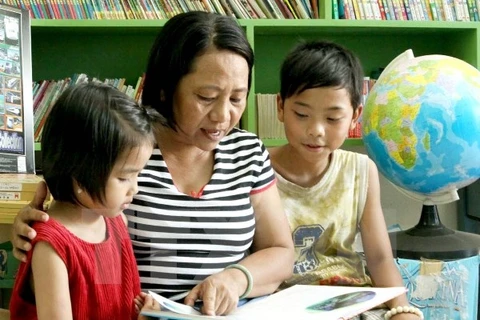Hanoi (VNA) - The participation of children in policy-making needs to be encouraged by families, schools and society, experts have advised.
Policy makers, researchers and representatives from social organisations and businesses gathered at a conference in Hanoi last week to discuss initiatives to promote children’s rights and their participation in the development of child-related policies.
It is essential to create a safe environment where children can voice their opinions, said Nguyen Phuong Linh, director of the Research Center for Management and Sustainable Development, while mentioning recently discovered child sexual abuse cases in the country.
"Most of the cases were discovered too late,” she said. “So it is really important that parents, schools and communities take time to listen and talk to children, making them comfortable to share their most intimate issues," she said.
The right for children to get involved in child-related issues has been included in chapter V of Vietnam’s Law on Children, and so are the responsibilities of adults to create favourable conditions to encourage the actualisation of those rights.
The importance of adults’ involvement in children’s participation is illustrated in the matter of how to get children involved in policy-making workshops, said Tran Thi Dieu Thuy, head of the Child Care and Protection Department under the Ministry of Labour, Invalids and Social Affairs.
“It’s just the mundane issues like whether children should take days off school in order to take part in the workshops – and the fact that their parents would have to take some time off work to take them there – that keep children out of the policy-making process,” she said.
Some projects and models that aim at boosting children’s confidence to make decisions in daily life were presented at the conference by representatives from social organisations.
Duong Thuy Ly, project co-ordinator at the Live & Learn Environmental Education centre, stressed the importance of the co-ordination between families, schools and society in promoting the comprehensive development of children.
“We shouldn’t be doing those PTA meetings where head teachers and parents gather to talk about students anymore,” she said. “Students should also be invited to the meetings and be able to raise opinions on issues that affect them.”
While acknowledging the efforts of projects from social organisations that have helped children be confident that their voices matter in policy-making, a representative from the Vietnam Union of Science and Technology Associations said that families and schools are the closest foundations on which such confidence should be placed.
“Instead of implementing projects outside of school that require a lot of effort from both children and project coordinators, the awareness-raising tactics should be integrated in the school environment in order to maximise their effects on children,” he said.
At the conference, based on opinions and suggestions by experts, the social organisations working on children’s rights made commitments to promoting models and initiatives on children’s participation in policy-making, as well as establishing and expanding a working network for children’s rights.
They also made commitments to provide consultancy and technical support for the State on children-related issues, as well as helping the State to monitor and evaluate the quality of children’s participation in the policy-making process.-VNA
Policy makers, researchers and representatives from social organisations and businesses gathered at a conference in Hanoi last week to discuss initiatives to promote children’s rights and their participation in the development of child-related policies.
It is essential to create a safe environment where children can voice their opinions, said Nguyen Phuong Linh, director of the Research Center for Management and Sustainable Development, while mentioning recently discovered child sexual abuse cases in the country.
"Most of the cases were discovered too late,” she said. “So it is really important that parents, schools and communities take time to listen and talk to children, making them comfortable to share their most intimate issues," she said.
The right for children to get involved in child-related issues has been included in chapter V of Vietnam’s Law on Children, and so are the responsibilities of adults to create favourable conditions to encourage the actualisation of those rights.
The importance of adults’ involvement in children’s participation is illustrated in the matter of how to get children involved in policy-making workshops, said Tran Thi Dieu Thuy, head of the Child Care and Protection Department under the Ministry of Labour, Invalids and Social Affairs.
“It’s just the mundane issues like whether children should take days off school in order to take part in the workshops – and the fact that their parents would have to take some time off work to take them there – that keep children out of the policy-making process,” she said.
Some projects and models that aim at boosting children’s confidence to make decisions in daily life were presented at the conference by representatives from social organisations.
Duong Thuy Ly, project co-ordinator at the Live & Learn Environmental Education centre, stressed the importance of the co-ordination between families, schools and society in promoting the comprehensive development of children.
“We shouldn’t be doing those PTA meetings where head teachers and parents gather to talk about students anymore,” she said. “Students should also be invited to the meetings and be able to raise opinions on issues that affect them.”
While acknowledging the efforts of projects from social organisations that have helped children be confident that their voices matter in policy-making, a representative from the Vietnam Union of Science and Technology Associations said that families and schools are the closest foundations on which such confidence should be placed.
“Instead of implementing projects outside of school that require a lot of effort from both children and project coordinators, the awareness-raising tactics should be integrated in the school environment in order to maximise their effects on children,” he said.
At the conference, based on opinions and suggestions by experts, the social organisations working on children’s rights made commitments to promoting models and initiatives on children’s participation in policy-making, as well as establishing and expanding a working network for children’s rights.
They also made commitments to provide consultancy and technical support for the State on children-related issues, as well as helping the State to monitor and evaluate the quality of children’s participation in the policy-making process.-VNA
VNA






















